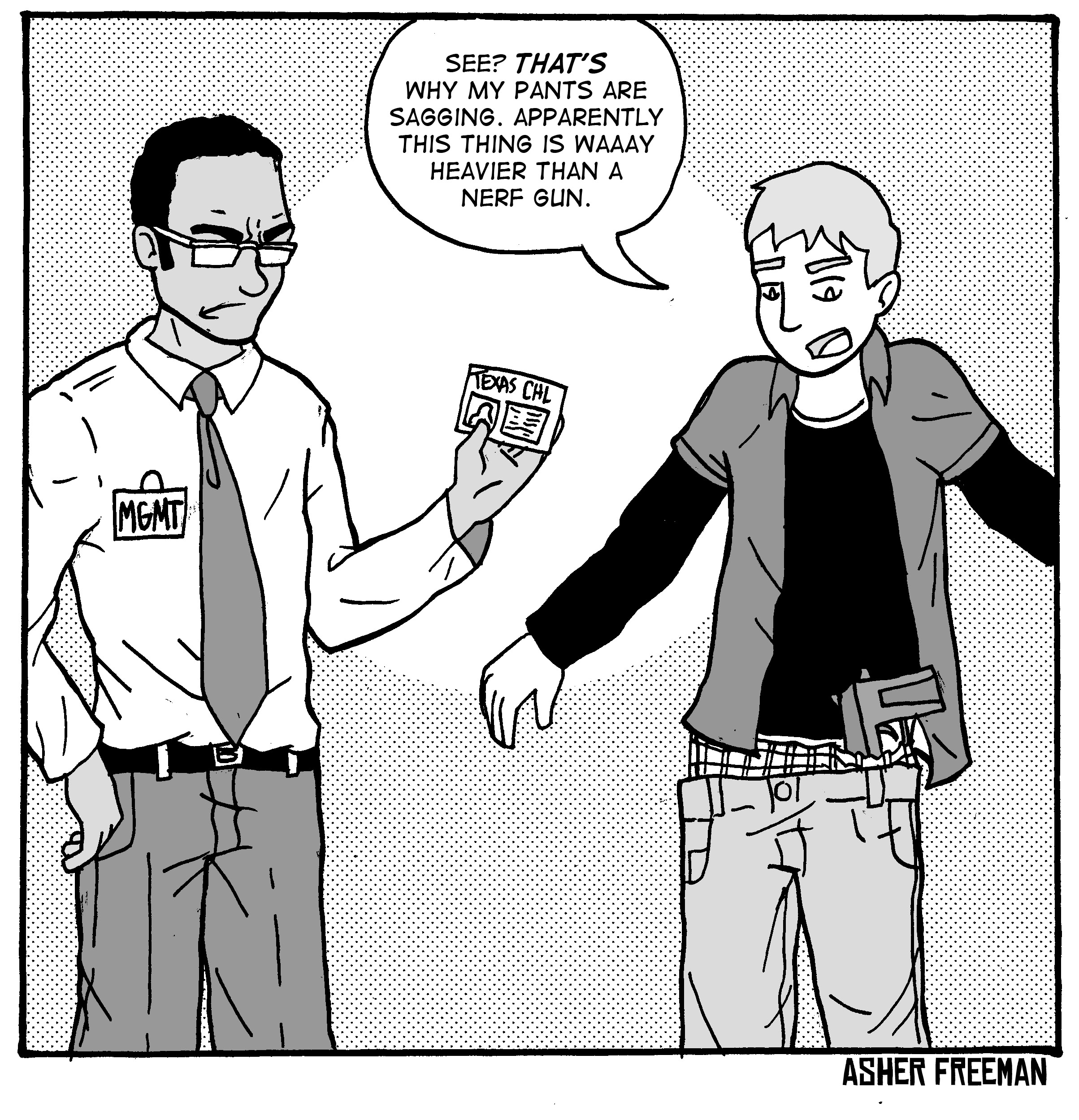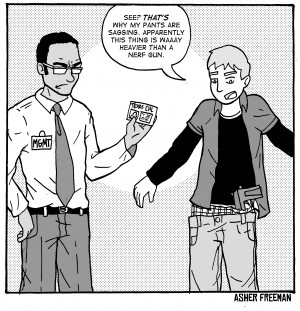For a long time, the Lariat Editorial Board has been starkly divided on the issue of guns and their regulations. Recently though, we all found common ground when we heard of a Florida concealed handgun licensing course being offered in Texas that basically allows Texans to get their CHL without adequate training. If there is one group of people who should be held to the highest standard possible, it is those carrying a weapon for use of deadly force.
A member of the Lariat Editorial Board chose to attend a Florida class held in Houston, bringing back insight into how easily people may receive these licenses and the lack of education and proficiency required.
The class, which began at 8 a.m. ended shortly before 11 a.m., meets Florida requirements, as they do not have a time minimum. In those few brief hours, the instructor herded a mass of people through lines to get fingerprinted, take a picture and shoot a gun.
In Texas, the three portions that took up most of the time in the Florida test — pictures, fingerprints, and “shooting” — are done in addition to a four-hour classroom training session.
The shooting portion of the Florida course consisted of a gun in a box. The applicant was to reach in the box with one hand and blindly shoot. It did not require any skill and no live rounds were used. If a person is expected to be able to safely and confidently carry a firearm, they should have to take at least a few shots at a target to prove that they know the basics of discharging a weapon.
In order to apply for a CHL in the state of Texas, you must complete a 4-6 hour training course, have adequate range instruction and take a proficiency test. The shooting test requires the applicant to shoot 50 rounds of ammunition from three, seven and 15 yards. A score of 70 percent is needed to pass. Alternatively the Florida course does not have a range portion to the test. The Texas test is easy enough that the majority of people taking it pass. It is unreasonable for a state to recognize a license that doesn’t require applicants to meet at least that state’s standard.
In addition to time at the range, Texas applicants are trained on the laws that relate to weapons and the use of deadly force; handgun use, proficiency and safety; nonviolent dispute resolution; and proper storage practices emphasizing those that eliminate accidental injuries to a child.
The Florida course does not have a set curriculum laid out, as they accept hunters education or “evidence of equivalent experience with a firearm through participation in organized shooting competition.”
While it is important that an applicant know the ins and outs of a gun, it is equally as important to know the laws specifically related to carrying concealed. Those types of laws as well as the proper way to conceal a gun are not taught in competition shooting or hunters education.
The course that our board member attended never addressed the nuances of the law. Laws can often times be difficult to understand or apply. For example, if a business has a sign on the door saying you cannot carry, you can still enter, since they do not have the ability to revoke your Second Amendment right. However, if someone notices that you are carrying concealed and asks you to leave, you must. If you fail to leave the building, you can be charged with trespassing, and trespassing while carrying concealed is a felony. While it is the CHL holder’s responsibility to learn the law, it is the instructors obligation to make sure he or she understands it. This is why an adequacy test is so important.
Not only do the Florida courses not fully teach any state laws, they do not touch on the gravity of the decisions that have to be made in a split second.
In the course our board member attended, the instructor never went over when a carrier is actually allowed to discharge their weapon or what they should do if they are ever faced with a situation in which they may need to defend themselves or others. The law leaves the justification of deadly force up to what the gun holder “reasonably believes to be necessary,” so it is important that an instructor explains what may or may not qualify as justification.
Texans are able to bypass many of the standards set by the state because Texas has signed reciprocal agreements with the state of Florida, allowing citizens with CHL’s issued by that state to legally carry in Texas and vice versa. While this may be convenient for many people who want to save time and money, it is unfair because the standards set by each state are vastly different. If you want to carry in Texas, or any other state for that matter, you should have to meet the minimum requirements of that state’s law. This is simply a way to attract more people who otherwise may not pass the Texas certification test.
Some states who hold reciprocal agreements with Texas, such as Nebraska, refuse to recognize an out-of-state license for citizens of their state, but still recognize non-citizens’ license.
This means that if you are a Nebraska citizen, you have to be licensed in your state. You cannot take the shortcut, like many in Texas do, and find a state that offers an easier course in order to get certified. If Texas residents want to carry a concealed handgun in Texas, they should be required to get a CHL issued by the state of Texas.
The best option would to implement the “equal to or greater standard” for recognition, such as is in Kansas. This means that for any outside license to be accepted in Kansas, the requirements must be as strenuous or more than those offered in the state.
Some people argue the idea here is simply to give people the means to get certified, and that the education portion of the process should be done on an applicant’s own time.
While this may work in some cases, for the majority of people, they simply are not well versed enough on the law or comfortable enough with a gun to be trusted without training.
Just because an applicant is getting an out-of-state CHL, they are still required to follow all the Texas laws, and unfortunately, there is no way to ensure that the Texans receiving these licenses are being educated on the laws if there is no test required.







